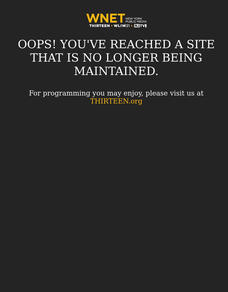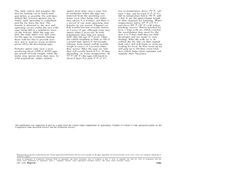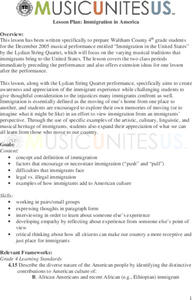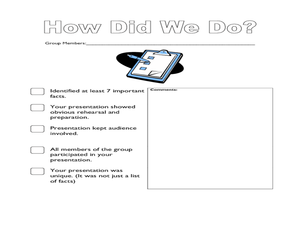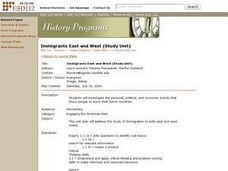Curated OER
We Are What We Remember
Students engage in research, small-group discussions, whole class discussions, family interviews, and interaction with multimedia resource material as they explore the relationship between memory and history.
Curated OER
Monuments, Memorials and Public Spaces
Monument and memorial lesson plans can get students thinking about important topics and time periods in history.
Curated OER
Dealing With Death
Students watch and analyze a video dealing with the topic of death. They answer discussion questions, identify examples of how death is represented in popular media, write a poem, create a memory book, and write a letter to someone who...
National Park Service
The Power of Remembrance
On every July 4th, we watch fireworks and celebrate our independence, but how is the history of the American Revolution preserved? Four social studies lesson guide learners through different memorials, commemorative objects, and restored...
Curated OER
Help Young Mathematicians Write Their Way to Math Success
Clear and concise writing should be an integral part of learning mathematics.
Curated OER
Hero or Tyrant: Connecting Beethoven’s Third Symphony to Napoleon, Part One
The second and third movements of the Eroica, Beethoven's Symphony No. 3, provides listeners with an opportunity to connect to French Revolution and to Napoleon Bonaparte. As they listen to the music, individuals draw what their ears...
Curated OER
Nifty Fifty State Trivia
A wonderful game on U.S. States Trivia awaits your class. In this geography lesson, they will play a Jeopardy-style game. All the worksheets with the questions and answers are embedded in this beautifully-designed plan. Your class should...
Curated OER
Hands-On Ways to Engage Students during Youth Art Month
Enjoy an artful departure from spring fever through creative art lessons.
Curated OER
Math: Matching Rods and Religion
Math and religious studies are integrated together using using cuisenaire rods and Kid Pix for this problem-solving exercise. In pairs, they match different colored rods to represent various groups of people. Meanwhile, students at...
Curated OER
Maus I and II: Pictionary
Why is visual literacy so important in understanding Maus? Introduce your class to basic elements of graphic novels with a game of pictionary. A list of 13 words are included, but you could potentially add some World War II-related terms...
Curated OER
The Pan-American Exposition of 1901
Students examine the impact of the 1901 World's Fair. In this lesson on invention and politics, students watch a video then conduct Internet research in order to learn about the Pan American Exposition. Students will create a brochure...
Curated OER
Busting More Myths Using the Scientific Method
Use the Mythbusters model to jazz up your scientific method lessons!
Curated OER
Oral Reports through 'Personality Bags'
Students prepare an oral book report on a biography they have read. They bring in a bag of objects they associate with the report's subject and use them as props for the report.
National Endowment for the Humanities
Cultural Change
High schoolers research the passage of the 19th Amendment as an illustration of the mutual influence between political ideas and cultural attitudes. They also read the Seneca Falls Declaration and explore the cultural shifts it both...
Curated OER
Oral traditions: Facilitating education through verbal traditions
Bring oral traditions into the classroom to engage learning and facilitate best practices. From story telling to listening skills, this article provides reasons and rational behind oral traditions as a tool for education.
Curated OER
Aztec Myths: Writing Editorials
Middle schoolers write an editorial giving an opinion of whether or not Quetzalcoatl has arrived and if so, what the Aztecs should do. They discuss whether or not they believe Quetzalcoatl is a god or a man, and use an Editorial...
Curated OER
Thornton Wilder's Our Town: The Reader as Writer
Students read a play and create their own play using Thornton Wilder's Our Townas a resource. In this play activity, students analyze how theatrical elements contribute to a play's meanings and effects. Students recognize differences...
Curated OER
Channel Catfish
Students study the life and biology of the Channel Catfish. In this aquatic biology lesson, students will examine the external and internal features of the catfish along with their breeding habits and environment. This lesson includes...
Curated OER
Preserving History for Illuminating Today's Values and Traditions
Students discover the value of oral history by creating their own audio recordings. For this traditions and customs lesson, students listen to a local historian discuss the idea of preserving history through oral traditions. Students...
Curated OER
The Presidential Physical Fitness Test
Students practice skills of physical fitness to prepare for The Presidential Physical Fitness Test. They practice daily using specific exercises like curl ups and the one mile run/walk. The lesson allows students to project a profile...
Curated OER
Immigration in America
Fourth graders examine the musical traditions that immigrants bring to the United States. They discuss the concept of home, complete the "My Home" worksheet, participate in a class discussion, and write a letter to a fourth grade...
Curated OER
Branches of US Government
Learners research the responsibilities of the legislative, executive, and judicial branches. In this U.S. government lesson, students research the jobs of those in each branch and present their finding to their classmates.
Curated OER
Death of a Salesmen - Essay Questions
In this literature worksheet, students respond to 8 short answer and essay questions about Arthur Miller's Death of a Salesman. Students may also link to an online interactive quiz on the play at the bottom of the page.
Curated OER
Immigrants East and West
Students investigate the personal, political and economic events that drove people to leave their home countries. They research Chinese migrations in the 1800s and the English migrations in the 1600s. They create an identity based on...


